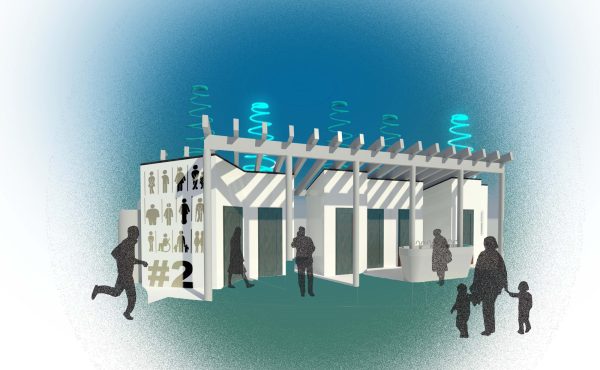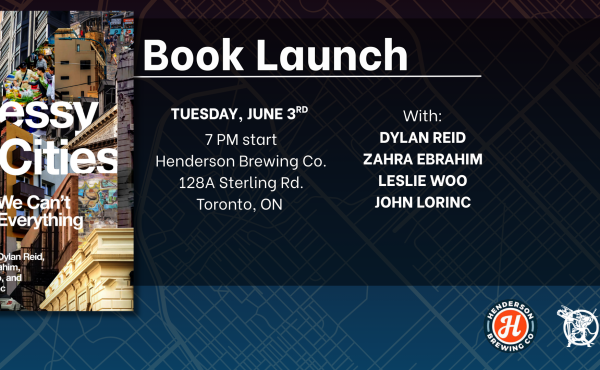
Despite recent media reports, I’d like to say that I’m having a good week. In fact, I haven’t been this excited about local politics in quite some time. There’s some really neat things happening across the city, and I’m fortunate to be involved with two specific campaigns that are rolling out the red carpet in April. Seven town hall forums have been announced this week: four for Better Ballots and three for the transit workers’ Let’s Talk campaign.
And what could better encapsulate the theme of public space than ballots and buses? Whether you’re passionate about moving people through the city or moving ideas through our web of local democracy, these two systems are what keep Toronto alive. One is a physical network of tunnels, tracks and routes and the other is a maze-like adventure filled with councillors, candidates, platforms, policies, ballots and regulations.
In both cases, we the people benefit when these networks run smoothly, and with as much accessibility as possible. A good transit system is affordable, reliable & comfortable. A good democracy is participatory, inviting, diverse and fair. The biggest problems facing the TTC are consistent underfunding and a reluctance to change, learn and grow at a quick enough pace to satisfy riders. And the biggest problems facing our local elections are low turnout, low turnover, lack of diversity and unfair results that allow Councillors to win seats with only 20% of the vote.
Well, this is your lucky month. Changes are needed in both systems and now is the time to have your voice heard. While TTC management should be congratulated for setting-up their Customer Service Advisory Panel, the transit union has taken the process one step further by going directly to the riders, and saying “Let’s Talk”. Hopefully, this process could lead to a new sense of trust, communication and mutual respect between TTC riders and workers.
And the Better Ballots forums are your chance to learn about 14 concrete proposals for voting reform in Toronto, and give your feedback and ideas.
If you care about how this city works, and want to make it better, I invite you to participate in both of these forums and contribute your own piece to the discussion!
Facebook event links:
Let’s Talk: TTC Riders and Workers
Downsview (April 11): http://bit.ly/bxkO6C
Scarborough (April 18): http://bit.ly/9FqV2Y
Ryerson (May 2): http://bit.ly/bSfyqL
Better Ballots: Choosing how we choose
North York (April 13): http://bit.ly/betterballots_NORTH
Scarborough (April 20) : http://bit.ly/betterballots_EAST
City Hall (April 26): http://bit.ly/betterballots
Etobicoke (April 27): http://bit.ly/betterballots_WEST
Disclosure: I earn a monthly honourarium for my work with Better Ballots, and I’m working on contract with the transit workers to develop their Facebook pages
(Cross-posted from Mez Dispenser)



8 comments
Great news, now if only the “Let’s Talk” town halls were ALL held in a location easily accessible by the TTC – it would be almost perfect.
The fact the transit union is contracting someone outside their collective agreement to make Facebook pages gave me a nice good, long laugh too. Thanks for a great start to my weekend!
In a democracy people also have the right to not care.
Hey Laurie,
Large organisations, no matter how committed they are to union solidarity and progressive values, will always contract out small jobs that aren’t conducive to a full-time position. That’s a completely separate discussion than whether the core workforce is unionised or contracted out to non-unionised companies. I don’t find my employment with ATU to be contradictory to their anti-privatisation message. In fact, it shows that they are practical, pragmatic and not purely ideologically-driven.
~ dave
Your definition of “diversity” is definitely skewed. It is not just about “women” or “visible minorities”. It includes “ethnic minorities” as well in addition to people from “immigrant backgrounds”. Think about adding another pie-chart which address this, rather than simply lifting it from academic research which is very narrowly focussed.
Hey Grace,
There are many ways to define and approach the idea of diversity. Better Ballots is using two (on our pie charts), you’ve pointed out two more, and of course there are many, many other angles including sexual orientation, age, physical ability, class, religion, etc…..
I don’t think one approach is more ‘skewed’ than another. They’re simply different, and achieve different purposes.
The reason we’re using “visible minorities” rather than “ethnic minorities†or “immigrant backgrounds†is directly related to who is generally marginalised in our society. The sad truth is, social and economic marginalisation and exclusion is much less related to ‘immigrant background’and more related to the colour of your skin. The darker your skin, the more marginalised you’re likely to be. Regardless of how long you’ve been here.
Besides, almost everyone here has an ‘immigrant background’, since this whole place was colonised not that long ago. I’d be curious to know what you mean by “ethnic minorities” though. Which City Councillors would you put in that category, who aren’t in the “visible minority” category?
What would your less-skewed numbers look like, using your definitions?
The better ballots initiative should be applauded. Nit-picking and semantic criticism against its definition of “diversity” is pointless and unproductive.
@Dave Meslin – being a non-visible minority immigrant can, at times, be exclusionary in subtle ways which lack supports explicitly offered, almost pressed on to visible minority immigrants. Maybe we’ll discuss that sometime… or you could ask the Mayor. Like me, he wasn’t born here either.
Dave Meslin’s comment: “The reason we’re using “visible minorities†rather than “ethnic minorities†or “immigrant backgrounds†is directly related to who is generally marginalised in our society. The sad truth is, social and economic marginalisation and exclusion is much less related to ‘immigrant background’and more related to the colour of your skin.”
Dave, you make some rather bround pronouncements but the sad truth is that ethnicity/culture is not as unimportant as people want to pretend it is, even though it currently isn’t captured by bureaucratic measures. I know your position is the standard politically correct version of events … but much of the evidence given to support it could be seen as a function of ethnicity/culture and economic status rather than just race. White does not always mean “white”… just ask many immigrants from Muslim countries who are technically cacuasion. And in fact, not that long ago, it was not uncommon to hear people talk about the “Irish” race, or the “Italian” race as being non-white.